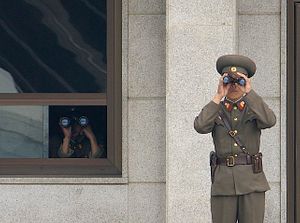In 2013, after watching her son and more than 15 other children die at her nursery due to starvation and lack of proper medical attention, Jung-Suk Shin*, a former nursery teacher, crossed over the North Korean-Chinese border, marking the beginning of a long, arduous journey. In China, she risked repatriation by Chinese authorities—so after going through Chengdu and Kunming, she had to escape to Laos and ultimately make her way to a police station in Thailand, where she was escorted to the South Korean embassy. After spending 40 days at a refugee camp, she boarded a flight to Incheon International Airport, bringing an end to her physical escape from North Korea.
Escaping North Korea results in a perilous journey for many. If defectors are caught by authorities in China, they face repatriation and years of imprisonment, torture, forced labor, and possible death in North Korea. However, for many, these risks are outweighed by the bleak prospects they face if they remain in the North, where they are forced to “unconditionally accept … and decide everything upon Great Leader Comrade Kim Il-sung’s instructions, and through every action, think only of the greatness of our Leader,” as enshrined in The Workers’ Party’s Ten Principles of the Establishment of a Unitary Ideology System. Generations of families are forced into prison camps if a single family member commits a misdeed against the state, even if there is no tangible evidence of a crime ever having been committed.
Despite widespread famine and ideological manipulation, many North Koreans prolong or forgo defection out of fear of the safety of their family members. Yeong-Geon Kim*, a former diplomat and worker at the Ministry of Foreign Affairs in North Korea, had several opportunities to seek asylum—unlike most North Koreans, he traveled abroad frequently due to his status as a diplomat. “The reason I continued 20 years of diplomatic life even after realizing the truth of North Korea was my family,” he told PSCORE in an interview. “[…]A diplomat can’t take their entire family—some of them must be left in North Korea—in essence, as hostages. If we attempted defection and failed, everyone would either die or would have to spend the rest of their lives in political prison camps.”
Defectors in South Korea, while physically free from the Kim regime, are still bound to the North Korean state. They adopt fake names and hide their North Korean accents so that their true identities remain hidden and undetected by the North Korean government, which goes through great lengths to punish and capture defectors and their families. Although many defectors were willing to share their stories with PSCORE to give greater insight into the human rights abuses in North Korea, they all had a common request: “Please ensure that my face is not shown.” Defection to South Korea has given them the ability to see the truth and question the world, but they remain faceless, because they must protect their family and friends who remain in North Korea.
Many hoped that Kim Jong-un’s rule would mark the beginning of positive changes in North Korean politics and society, for Kim received his education at a boarding school in Switzerland, where he was known to be an avid fan of basketball and was exposed to Western culture. Yet Kim’s rule thus far has been marked by a series of actions that show his determination to solidify his power and maintain his family’s regime. There is little sign that conditions are improving in North Korea, despite continued sanctions from the international community.
It has been over 60 years since Korea was separated into two nations, and both nations have undergone distinct changes. South Korea, despite recurring threats from the North, is a thriving nation. Since the Korean War, it has undergone “the Miracle on the Han River,” a period of rapid economic growth, transforming it from a country that once was poorer than North Korea to a nation that is now a member of the G20. Yet a nation’s success is not defined solely by its economic status. While South Koreans have achieved explosive economic growth, millions of people in the North—former brothers, people they shared the same history with for thousands of years—are voiceless, blinded, and faceless. Considering this, has South Korea truly succeeded?
While Jung-Suk Shin adopted a different name in South Korea, unlike many other defectors, she does not hide her North Korean accent. Instead, she speaks with confidence: “I do not hide my accent, because I proud that I am from North Korea … I want to raise awareness of the human rights abuses that people there face.” And so, the rest of the world must listen to Shin’s voice and also raise awareness of those who remain voiceless and blind.
*Names have been changed to protect identities. Parts of interviews were adapted from the PSCORE publication The Faceless Ones.
Jinny Ha-kyung Kim is a student in Princeton, NJ and an intern at PSCORE (People for Successful Corean Reunification).

































